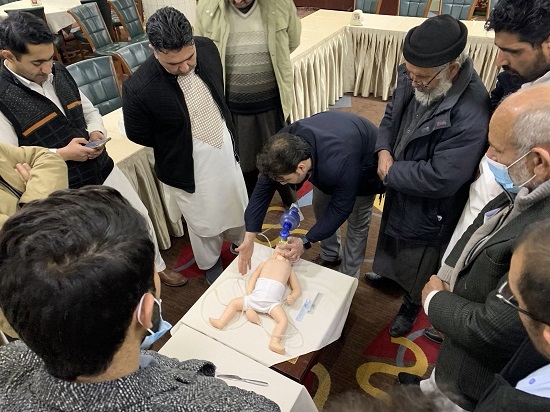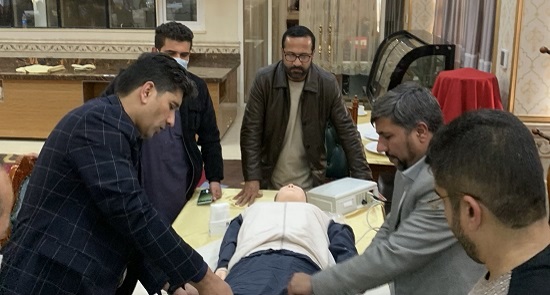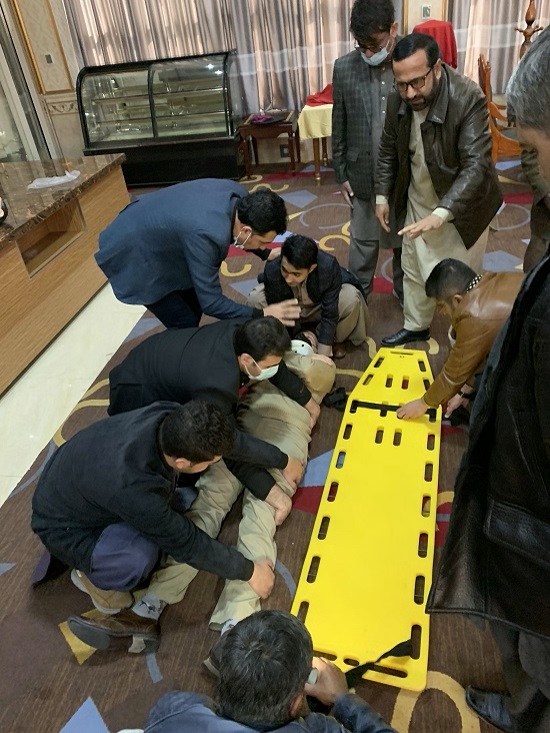 Kabul, 16 December 2021 – In response to the current gap in Afghanistan in standardized management of trauma patients and to improve survivability from injuries, the World Health Organization (WHO) organized a 10-day training in the WHO/ICRC Basic Emergency Care Course in Kabul from 7 to 16 December 2021. Funded by USAID, the course aimed to enhance trauma and emergency care across the country for frontline health care providers who manage acute illness and injury with limited resources.
Kabul, 16 December 2021 – In response to the current gap in Afghanistan in standardized management of trauma patients and to improve survivability from injuries, the World Health Organization (WHO) organized a 10-day training in the WHO/ICRC Basic Emergency Care Course in Kabul from 7 to 16 December 2021. Funded by USAID, the course aimed to enhance trauma and emergency care across the country for frontline health care providers who manage acute illness and injury with limited resources.
WHO international trainers delivered the basic emergency care course to 24 Afghan surgeons from diverse provinces. After successful completion of the course, all trainees then received another 2-day course which allowed them to train 50 further physicians and nurses. With ongoing support from WHO, the new Afghan trainers will be responsible for cascading the training to frontline providers in the provinces where the trauma burden is high.
WHO’s Clinical Services and System is dedicated to strengthening the emergency care systems that serve as the first point of contact with the health system for much of the world, and to enhance the development of quality, timely emergency care accessible to all, particularly the vulnerable Afghan populations affected by continued political instability and war.
 “Attending this course as a refresher was very important for me and my colleagues from 7 regions of Afghanistan who struggle every day to save more lives affected by serious injuries in a few critical seconds or minutes,” said Dr Abdullah Halim, general surgery specialist at Kandahar Mirwais Regional Hospital. “Each of the 24 future trainees of this course will train at least 100 physicians and nurses in many deprived areas of Afghanistan, which ultimately upgrades the quality of trauma care in my country, especially during this difficult time,” Dr Halim added.
“Attending this course as a refresher was very important for me and my colleagues from 7 regions of Afghanistan who struggle every day to save more lives affected by serious injuries in a few critical seconds or minutes,” said Dr Abdullah Halim, general surgery specialist at Kandahar Mirwais Regional Hospital. “Each of the 24 future trainees of this course will train at least 100 physicians and nurses in many deprived areas of Afghanistan, which ultimately upgrades the quality of trauma care in my country, especially during this difficult time,” Dr Halim added.
 Asma Hashemi, a nurse working at the Maidan Shahr primary health care facility in central Afghanistan’s Maidan Wardak province, was among the 20 female health workers and physicians who attended the course. With a smile on her face, Hashemi said she was “very happy to be here and learn something that enables me to help my people”.
Asma Hashemi, a nurse working at the Maidan Shahr primary health care facility in central Afghanistan’s Maidan Wardak province, was among the 20 female health workers and physicians who attended the course. With a smile on her face, Hashemi said she was “very happy to be here and learn something that enables me to help my people”.
The UN health agency supports 132 health care facilities across the country, including 8 specialty hospitals, 6 regional hospitals, 2 teaching hospitals, 2 basic health centres, 26 provincial hospitals, 28 comprehensive health centres and 60 district hospitals.
As trauma care in Afghanistan continues to be a priority for WHO, the Organization directly supports 130 trauma care units and 67 blood banks across 34 provinces in the country, as well as extending its health care system with information management, building national capacity, strengthening service delivery, developing contingency and mass casualty management plans and conducting simulation exercises.
Media contact
Mr Mehdi Ansari Jovini
Communications Officer
WHO Afghanistan
Email:








